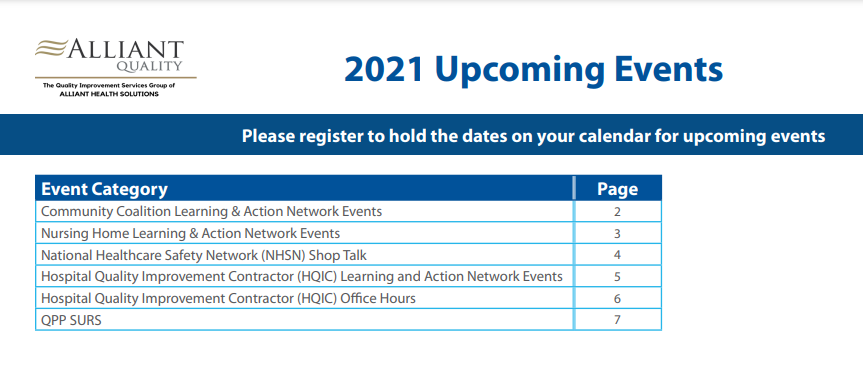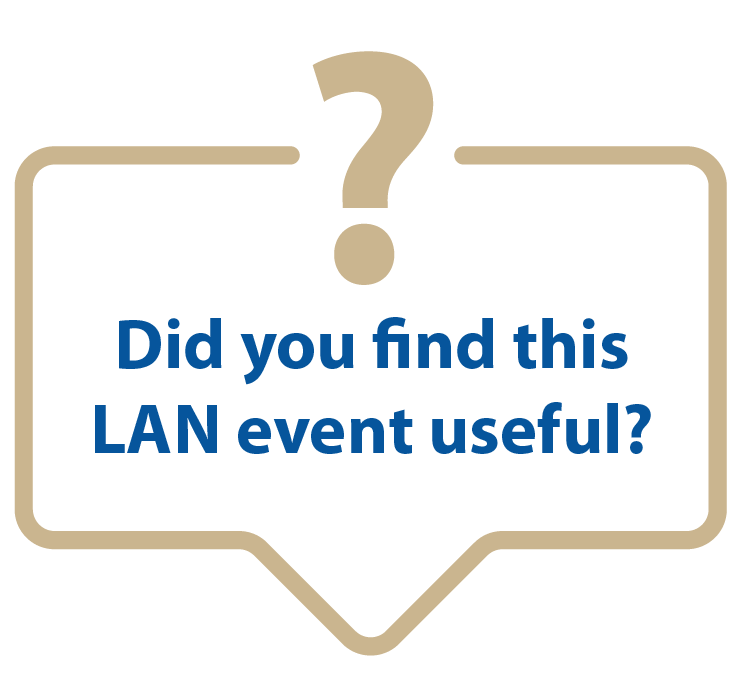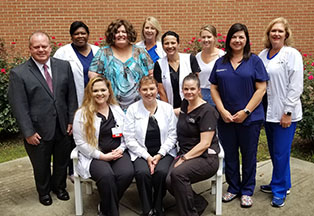|
|
|
|
This monthly newsletter highlights the latest insights, resources, and evidence-based best practices.
Our hope is that this newsletter makes it easy for you to stay on top of trends and allows you to provide the best possible care for those you work with and serve.
|
|
|

COVID-19: Emergency Use Authorization for Tocilizumab Monoclonal Antibody Product
On June 24, the Food and Drug Administration released an Emergency Use Authorization (EUA) for tocilizumab, a COVID-19 monoclonal antibody product. CMS created new HCPCS codes, effective June 24, for tocilizumab and to administer it in an inpatient setting. Learn More
|
Upcoming Learning and Action Network (LAN) Events
HQIC LAN: Exploring Sepsis Strategies: Part 1 Early Identification, Patient Family Engagement & Disparities in Care
Tuesday, August 24 at 1-2 p.m. ET | 12-1 p.m. CT | 10-11 a.m. PT
Join the IPRO, Alliant and Telligen HQICs for Part 1 of a dynamic two-part LAN event featuring proactive strategies and tools for preventing all-cause harm related to sepsis and readmissions. Part 1 will focus on the importance and impact of:
- Understanding the interconnectedness of early identification, patient family engagement and disparities in care to enhance patient safety.
- Learning how a sepsis screening tool was successfully implemented and achieved results in a 100-bed rural hospital using a multidisciplinary approach.
- Hearing about a sepsis survivor’s experience and how early identification could have assisted with improving care delivery and patient outcomes.
Who should attend? Nursing, Emergency Room, Quality, Infection Prevention and Pharmacy staff, Clinical Leaders and Physicians
Register Now | Event Flyer
 Important Update: There have been some changes to the LAN registration links. If you downloaded Alliant's Upcoming Events PDF prior to July 2021, please disregard it. A new PDF with updated registration links has been added to the Virtual Education Events webpage.
View All Upcoming Events Here Important Update: There have been some changes to the LAN registration links. If you downloaded Alliant's Upcoming Events PDF prior to July 2021, please disregard it. A new PDF with updated registration links has been added to the Virtual Education Events webpage.
View All Upcoming Events Here
Past Learning and Action Network (LAN) Events
HQIC LAN: Establishing a Robust Pain Management Initiative Within Your Hospital
Recorded on July 27
Two speakers from the Pain Assessment and Management Initiative (PAMI) team at the University of Florida College of Medicine – Jacksonville discussed building a multidisciplinary pain management team, establishing buy-in from busy providers and producing patient education resources tailored to your hospitals’ needs. Check out the slides for resources!
Watch Recording | View Slides

If Yes, Click Below.
Click here if you attended the April LAN event and were able to "use tomorrow" what you heard during the webinar.
View All Previous LAN Event Recordings
Past Partner Event
HANYS HQIC provided the following LAN event on July 14, 2021: Recovery Strategy for CLABSI Rates After COVID-19 Pandemic’s Impact
Questions? Contact EQIC Education & Events Support at learning@hanys.org.
|
Behavioral Health/Opioid Stewardship
Opioid Dangers and Hospitalization
Despite guidelines recommending careful prescribing and monitoring of hospitalized patients receiving opioids, evidence suggests that patient safety risks persist, including over-sedation leading to respiratory depression and possible death. In addition, the widespread use in hospitals and discharging patients on opioids can lead to long-term use, misuse and potential dependence and addiction. In the inpatient setting, opioids are among the drugs most frequently associated with adverse events. Read More About Hospital Inpatients and Safer Opioid Use
Highest Impact, Least Effort: Opioid Harm Reduction Related Measures
Did you know there are six harm reduction-related measures where your improvement work can have the highest impact with the least effort? Check out the American Hospital Association’s STEM THE TIDE: Opioid Stewardship Measurement Implementation Guide (page 21, shared in last month’s newsletter). The measures with the highest impact and least effort to implement include:
- Percent of patients with opioids and benzodiazepines co-prescribed
- Naloxone prescribed for opioid overdoses or high-risk patients
- Opioid prescriptions >90 MMEs daily
- Proportion of hospitalized patients administered naloxone,
- Number of urine/blood drug screens
- Opioid controlled substance agreement signed
How many of these measures does your organization have in place? Read the Guide
Patient Safety
Patient Safety Networks
Check Out Alliant HQIC's Patient Safety Networks Webinars
Alliant HQIC’s patient safety networks kicked off in late July with the following topics:
- ADEs - anticoagulants and glycemic agents
- ADE and Opioid Stewardship
- CAUTI/CLABSI
- Readmissions
- Sepsis
Each of these networks consists of a five-part series of interactive 30-minute webinars. Subject matter experts and quality improvement advisors offer guidance and use tools such as the fishbone diagram and PDSA worksheet that will allow participants to identify and develop action plans in specific patient harm areas and drive improvement. Learn More
Candida auris
CDC reports two outbreaks of pan-resistant Candida auris
The CDC identified two independent outbreaks of pan-resistant strains of Candida auris identified through routine screening by the CDC’s Antibiotic Resistance Laboratory Network from January-April of this year. The CDC says C. auris tracking updates have been delayed because of the COVID-19 pandemic. The pandemic may have also contributed to increased cases since some patients with severe COVID-19 required intubation and other invasive devices that put them at higher risk of C. auris infection. Read More
NHSN Reporting
Join Alliant Quality’s Hospital Group in the NHSN
The CDC’s National Healthcare Safety Network (NHSN) is the nation’s most widely used healthcare-associated infection tracking system. NHSN provides facilities, states, regions and the country with data to identify problem areas, measure the progress of prevention efforts, and ultimately eliminate healthcare-associated infections. Join Alliant Quality’s hospital group in NHSN and accept the updated confer rights template so we can best assist you in your infection prevention and control efforts. If your hospital is not currently reporting data to NHSN or you have questions regarding infection surveillance and reporting, contact Amy Ward, Alliant Quality Infection Prevention Specialist, at amy.ward@allianthealth.org. Read More
Pressure Ulcers
AHRQ Toolkit for Preventing Pressure Ulcers in Hospitals
The Agency for Healthcare Research and Quality (AHRQ) created a toolkit to assist hospital staff in implementing effective pressure ulcer prevention practices through an interdisciplinary approach to care. Each year, more than 2.5 million people in the United States develop pressure ulcers. These skin lesions bring pain, associated risk for serious infection and increased health care utilization. The supporting materials in this toolkit help hospitals become familiar with each of the components of the toolkit and learn how to overcome the challenges associated with developing, implementing and sustaining pressure injury prevention guidance. View the Toolkit
Sepsis
Printable Action Items for Sepsis and Septic Shock Resuscitation
The Surviving Sepsis Campaign’s Hour-1 Bundle describes action items for initial resuscitation efforts when sepsis or septic shock is recognized. The campaign created a pocket card and badge buddy image that’s ready for production and distribution. Please consider adding this tool to your hospital's sepsis campaign. See The Complete Guidelines and Hour-1 Bundle
Health Equity
NYSPEP On-Demand Training: Race, Ethnicity and Language (REaL) Data Collection: How and Why We Ask
This program is for frontline staff and focuses on strategies aimed at collecting race, ethnicity, and language (REaL) data to ensure that quality and equitable health care is delivered to all patients. Within the e-learning program, the participant will be guided to learning specific data collection strategies and best practices to improve and increase patient self-identification of REaL information to help patients, families, and/or their caregivers understand why we collect REaL data. This skill-based training is tailored to frontline staff responsible for registering patients in addition to other providers who may collect patient demographic data. Register Now
Readmissions/Care Transitions
AHRQ Handbook Highlights Key Elements of Engaging Patients and Families in Discharge Planning
Discharge from hospital to home requires the successful transfer of information from clinicians to the patient and family to reduce adverse events and prevent readmissions. Engaging patients and families in the discharge planning process help make this transition in care safe and effective. Strategy 4: Care Transitions from Hospital to Home: IDEAL Discharge Planning Implementation Handbook highlights the key elements of engaging patients and families in discharge planning. Read the Handbook
Culture of Patient Safety
Commit to Improving Your Culture of Safety
A culture of safety is essential to reducing preventable harm and improving patient outcomes. Teamwork training, leadership rounding and unit-based safety teams have been shown to decrease patient harm and improve safety culture measurement. In addition, being a visible leader and talking with front-line staff are critical tactics to enhancing patient and staff safety. Below are resources to help:
|
COVID-19 Care
National COVID-19 Resiliency Network (NCRN)
Alliant is a strategic partner with Morehouse School of Medicine on the National COVID-19 Resiliency Network (NCRN) to mitigate the impact of COVID-19. NCRN is created for the community, by the community with the intent to ensure the diverse needs of our nation are understood and addressed. Together, with your partnership, we can reduce the negative outcomes and impact of COVID-19 on our communities. Will you join us? Subscribe to the NCRN newsletter or join the Regional Community Coalition to let your voice be heard.
You can also download the NCRN app to quickly locate COVID-19 resources, testing locations and social services in your community:
COVID-19 Vaccine Resources
Guidance for Health Care Leaders During the Recovery Stage of the COVID-19 Pandemic: A Consensus Statement
The COVID-19 pandemic disrupted many aspects of health care delivery and placed unprecedented pressure on health care workers. Based on input from an international panel of individuals with expertise in health leadership, health care and public health, this consensus statement outlines 10 imperatives to guide health and public leaders during the post-emergency stage of the pandemic. Imperatives addressed in the framework include supporting staff well-being and psychological health, preparing for future emergencies, managing the backlog of delayed care, and the importance of sustaining learning, innovations and collaborations that arose during the pandemic. View the Full Article
Safety Implications of Different Forms of Understaffing Among Nurses During the COVID-19 Pandemic
During the first weeks of the COVID-19 pandemic, 120 nurses were surveyed about nurse-to-patient staffing ratios, skill mix, and near misses in their hospitals. Personnel understaffing led to increased use of workarounds, and expertise understaffing led to increased cognitive failures, both of which shaped near misses. Hospital leaders should recognize both forms of understaffing when making staffing decisions, particularly during times of crisis. View the Full Article
Alliant Quality COVID-19 Vaccine Resources
Curated resources and best practices to support long-term care facilities, clinics, providers, and staff as they navigate vaccine distribution. Alliant Quality COVID-19 Vaccine Resources
COVID-19 Updates for Vaccinated/Unvaccinated
The COVID-19 vaccines are changing how we protect ourselves and others. Guidance has been updated here for those who are fully vaccinated, unvaccinated and some other situations. Find the current update, as well as links to the COVID-19 tracking map, here: COVID-19 Updates
Warning Signs and Symptoms of Heat-Related Illness
Heat-related illnesses are preventable. Learn the symptoms and what to do if you or a loved one shows signs of having a heat-related illness. Read More
|
Best Practices
Emory Mobilizes Vaccination Events in Atlanta-Area Communities
With only 38% of Georgia’s population fully vaccinated against COVID-19, Emory Healthcare began sponsoring vaccination events in neighborhoods around the Atlanta metro area. One recent effective strategy was to set up a table in front of the Emory Hillandale Hospital with a sign that said: “Meet the Doctors.” Emory physicians Augustine Conduah and Victoria Green were onsite to answer questions from those still hesitant to get a vaccine. Read More
AdventHealth Presents Patient Experience Excellence Awards
Georgia-based AdventHealth recently presented Patient Experience Excellence Awards to honor AdventHealth Murray, AdventHealth Gordon and AdventHealth Medical Group departments and medical practices for delivering exceptional whole-person care to every person, every time. To receive this recognition, departments and medical practices must score in the top quartile for patient experience. List of Honorees
Hospital Heroes
South Alabama Hospital Celebrates No Infections Even as Line Days Tripled
 While most hospitals lament that While most hospitals lament that their infection rates, particularly CLABSI, have gone up during the pandemic, one hospital in south Alabama has had no infections (CAUTI or CLABSI) even though they tripled their line days. their infection rates, particularly CLABSI, have gone up during the pandemic, one hospital in south Alabama has had no infections (CAUTI or CLABSI) even though they tripled their line days.
According to the staff at North Baldwin Medical Center (photo at right) in Bay Minette, Ala., they continued their nurse-driven protocol for foley removal. They ensured they stayed focused on maintaining the lines and foleys. In addition, they implemented alternate foley devices for females and are working on a male option.
The hospital’s emergency department is working hard not to insert catheters, and the hospitalist program, which is fully engaged, works with nurses to ensure consistency of care. The hospital has daily safety huddles each morning to discuss infections and other safety issues. An interdisciplinary team also meets daily to discuss each patient, particularly those at most risk, and the CEO personally visits all patients.
|
|
|
Connect with us!
    Click here if you'd like to share your corporate profiles with us and we'll connect with you!
Click here if you'd like to share your corporate profiles with us and we'll connect with you!
|
| |
Hospital Quality Improvement Project Collaborators


|
For more information about Alliant Quality, visit the website: www.alliantquality.org
For questions or information about free technical assistance, please contact:
Share this email with a friend or colleague:  
|
|
|
|
|